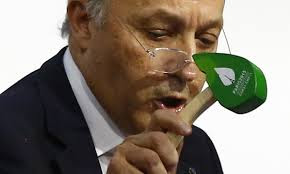 |
| Laurent Fabius brings down his gavel at the Climate Change Conference and declares the Paris Agreement adopted |
Well, David Cameron has kept that promise. His government has made a decision. A firm irrevocable decision.
To put off deciding until next June.
Boris Johnson, the present Conservative Mayor of London, opposes Heathrow expansion. So does Zac Goldsmith, the Tory candidate to replace him. It’s clear that a decision in favour of Heathrow would damage Goldsmith’s chances to keep London, a predominantly Labour city, in Tory hands.
Perish the thought that such considerations may have weighed with Cameron, in his glorious decision not to decide.
In any case, that tendency to dither is by no means out of character for Cameron. He’s never been good at making up his mind. Sometimes, he makes it up and then has to unmake it a while later.
The best example concerns military action in the Middle East.
On 29 August 2013, David Cameron told the British House of Commons:
“…on this issue Britain should not stand aside. We must play our part in a strong international response; we must be prepared to take decisive action to do so.”
On 2 December 2015, the same David Cameron told the House of Commons:
“The question is this: do we work with our allies to degrade and destroy this threat, and do we go after these terrorists in their heartlands, from where they are plotting to kill British people, or do we sit back and wait for them to attack us?”
You’ve got to admire the consistency, don’t you? That full-hearted commitment to action. The determination to wipe out a clearly identified redoubtable enemy. And Britain must help. Unfortunately, in 2013 Cameron was talking about action against Syria’s vile dictator, Bashar al-Assad. One of the groups fighting Assad was ISIS who would doubtless have been delighted to see missiles raining down on the President.
In 2015, the action was against the execrable terrorist group ISIS, one of whose enemies is Syria’s vile dictator, Bashar al-Assad. Who must be delighted to see airstrikes being flown against his rebellious foes.
Ah, well. Cameron knows his own mind. Well, he knows the state it’s in today. More or less. Though it might be better if you asked in six months.
With his sureness of touch, Cameron’s more than ready to cope with the situation he’s plunging into, in the Middle East.
There we see the Russians running airstrikes, alongside the US, British and French, though to be honest the Russians have been doing rather a lot of bombing up in the North West, where there aren’t any ISIS people, though there are anti-Assad rebels. Those are the rebels that France, Britain and the US support. After bombing them, Russian planes fly close to the Turkish border and, according to the Turks, on occasions they stray across it. So when this happened once to often for Turkish tastes, they blew the plane out of the sky.
Meanwhile, Turkey has been training Sunni and Kurdish forces in Northern Iraq to fight ISIS. Back home, Turkey is fighting Kurdish rebels. And Iraq would really rather like Turkey to withdraw its troops from Iraqi soil. However, Iraq doesn’t have an army forceful enough to impose its will within its own borders. Shia dominated, the government is dragging its feet over incorporating Sunnis into that army, leading to delays in giving itself an effective military. The delays were deplored by the British Defence Secretary, Michael Fallon, who knows that airstrikes alone won’t achieve victory against ISIS. He needs someone to put in forces on the ground; Iraq can’t; Syria can, but its army’s controlled by Assad.
Confused? So are the Tories. How many sides are involved in this fighting? How many agendas are being followed? What would “victory” look like?
How can any of us know when the job is done? What are our objectives and how shall we know when we’ve hit them? What’s the exit strategy? That same Fallon calls progress “agonisingly slow.” That’s code for “we have no idea of where we’re going or how long it’s going to take to get there.”
Par for the course for the government Cameron leads. And the non-decision on airport expansion in South East England makes the point. Because, at the time of the historic Paris Agreement on Climate Change, only one option should really have been recommended: no expansion at all. In fact, we ought to be working on reducing our excessive dependence on air transport.
That option, sadly, wasn’t even on the table.
No comments:
Post a Comment